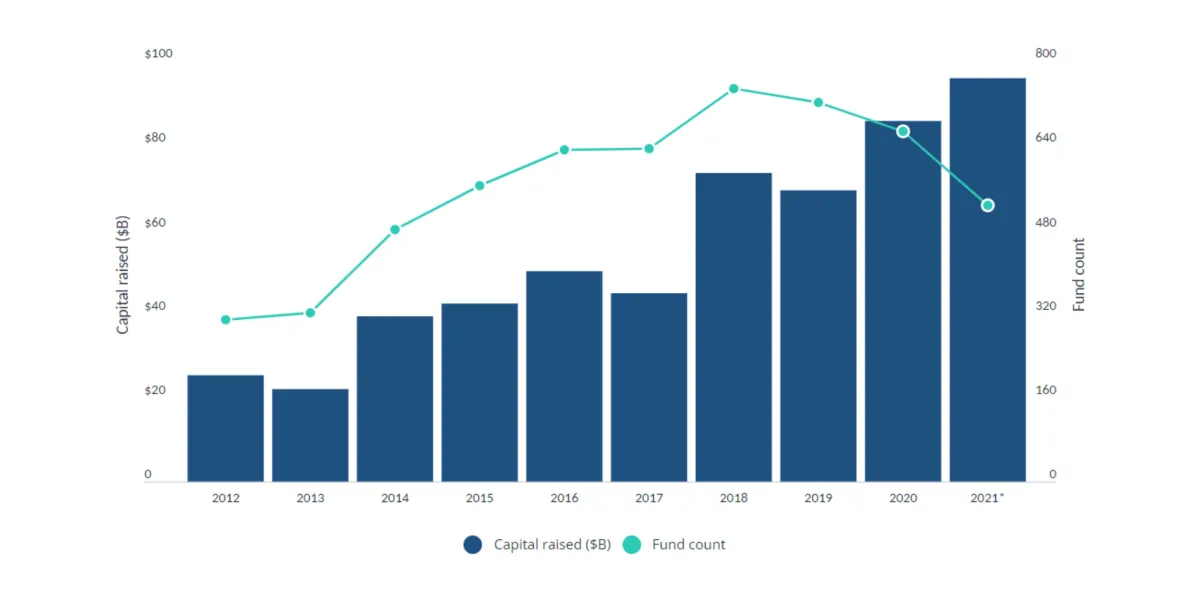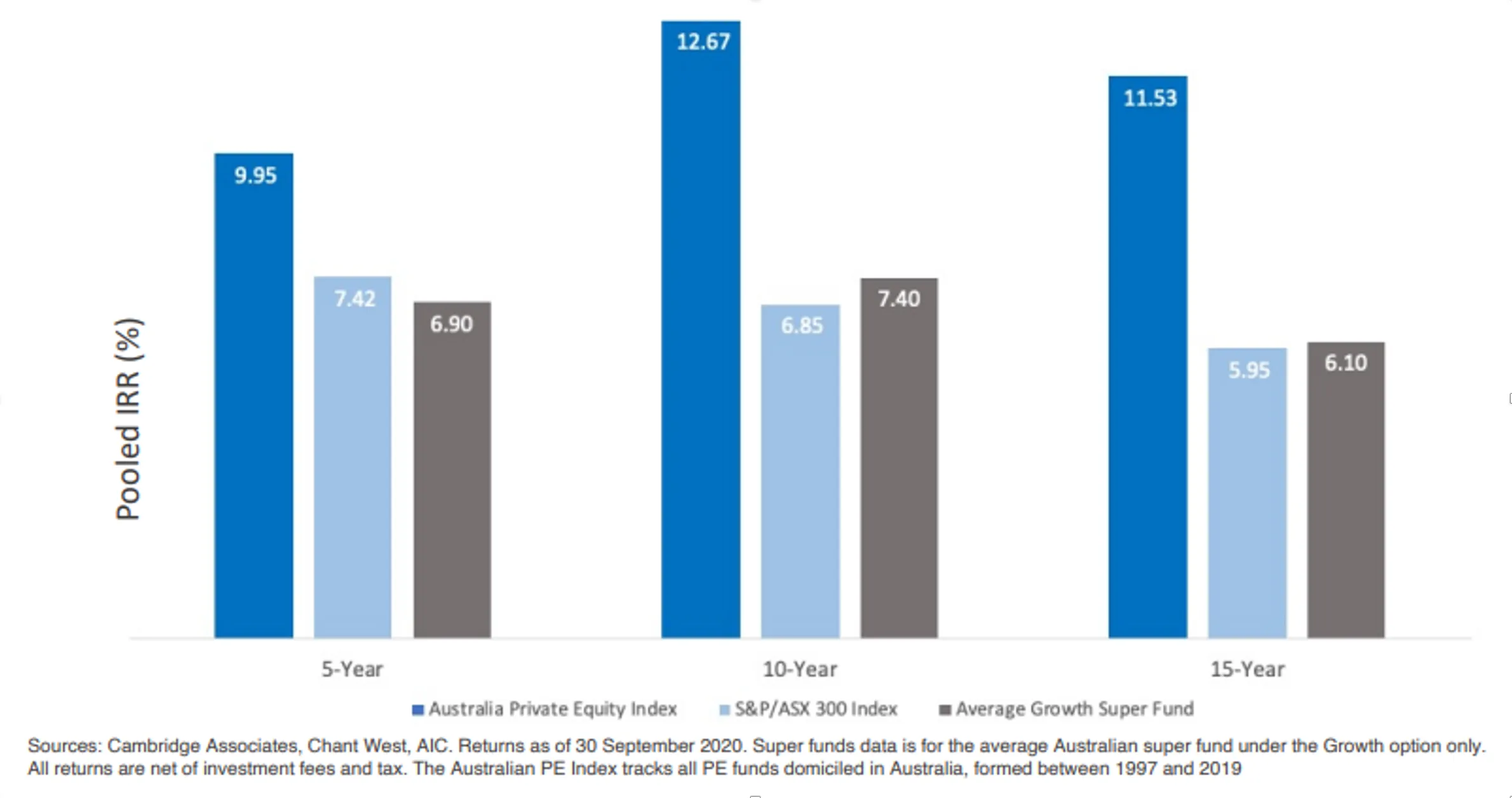Tim Whybourne
December 1, 2021


Well, that attitude certainly worked for him but you have to be smart with your risk-taking, as he was.
I have been investing in markets for over 20 years now and to be honest, it is really only the last 5 years that I have started to consider unlisted investments in both private equity and venture capital.
The reason for this is that over the past decade, it has been relatively easy to make good returns in listed markets with less perceived risk, the model wasn’t broken so it didn’t need fixing.
However, with interest rates at record lows, that low hanging fruit isn’t there anymore. It may have been taken from listed markets – meaning people like me that are chasing higher returns have been forced to look up the risk spectrum when it comes to investing.
Venture capital has always had a somewhat elusive reputation, especially in Australia over the last 10 years.
Venture capital is perceived to be an asset class that is only accessible by the very rich as it typically involves very high investment minimums (historically $500,000- $1,000,000) and requires you to lock that money away for periods of 10 years plus. However, that has slowly changed in recent times to the point that today, you can even gain exposure to the asset class through an ETF with no minimum investment and no lock-in period.
The dictionary defines Venture Capital as capital invested into a project in which there is a substantial element of risk, typically a new or expanding business.
Venture capital is simply a sub section of private equity so it is important to touch on that too.
Investing in private equity simply means investing in private businesses. Private equity is composed of funds and investors that directly invest in private companies, or that engage in buyouts of public companies resulting in the delisting of public equity.
Private equity is typically associated with investing in later-stage, established companies that have profit and have cash flow but have not yet listed on public markets.
Venture capital on the other hand is invested at the very early end of private equity. This means investing in startup businesses in various stages often without any revenue or sometimes without any clients.
Within venture capital, there are several different classes of venture capital:
By definition, the people putting money into venture capital are self-explanatively called venture capitalists but in practice it can just be mums and dads either themselves or through an advisor such as myself.
Venture capitalists can be anyone from a single investor to a fund manager. Much like the listed funds that you would be familiar with in listed markets, there are also funds constructed to go into venture capital.
There are two ways to invest in venture capital:
In my opinion, the risks and returns of venture capital are at the very pointy end of what investors can invest in. More often than not, these companies don’t yet have revenue, they might not have staff, and if investing in an individual company they certainly don’t have an established track record. These are just to name a few of the risks so as an investor, there are a lot of risks to consider.
However, as with all investments, there is a direct correlation between risk and return, with potential high loss comes potential high returns.
With venture capital, because you’re often investing in an early business idea with higher associated risk, the financial return that you can expect for risking your capital is high.
It is also important to note that there can be a big difference between expected return and actual return. If you invest in the wrong venture capital fund or the wrong venture capital idea, there is a risk of complete loss. It’s important to understand that the risk of total loss in listed markets is far smaller.
In summary, there are big risks involved in a venture capital investment, but also, big potential rewards.
Venture capital is certainly not for everyone.
If you would like to allocate capital to venture capital you have to be comfortable that it’s the kind of money that you need to be able to afford to lock up for a long time without the need to use it and ultimately you need to be comfortable with the possibility you could lose it. The typical lock-in period for these types of investments is 10 years; sometimes it can be even longer.
For many years only the biggest institutions were able to allocate to private equity but this is now changing as the number of venture capital funds rise and the number of startup companies in which they can invest in around the globe multiply.
In my view, now is a good time to invest in venture capital (VC) because the backdrop for venture capital in Australia has never been stronger. The chart below shows the trend of funds raised by VC over the past decade from $20bn in 2012 to over $80bn in 2021.

Even though I believe that Venture Capital is even more appealing than it has been in the past, historically VC has pretty consistently outperformed listed markets on a 5 year, 10 years and 15 years basis (this is show in the chart below).

Private equity now accounts for 30% of the M&A market according to a report recently released by Ernst and Young. The same report stated that private equity firms were involved in US$868 billion worth of acquisition deals globally.
The reason the background for VC is so healthy at the moment is that there is so much money ‘washing around’. Investors have been forced up the risk spectrum as interest rates get lower and lower. Now that interest rates have bottomed out, investors are still forced to work harder to get their desired rate of return.
We are living in an era where digital technologies are as advanced as they have ever been and this will only continue. Populations around the world have faster, more accessible internet and this is only increasing the rate at which we communicate and share information. Our technologically-driven world provides global opportunities for venture capital companies.
You could be sitting in a boardroom in Sydney or Brisbane and have the ability to run a company with staff all over the world. COVID-19 has certainly accelerated and normalised global business set-ups, providing opportunities that weren’t possible 10 or even 5 years ago.
So, there’s a lot of money chasing those opportunities and there have never been more startups to choose from. I believe we should expect to see more, what they call “unicorns” than ever before (a private company with a $1bn+ valuation).
What this means for investors is that more venture capital funds are popping up to chase these opportunities and there are actually fewer companies listing on the stock market leaving more opportunity in private markets.
Twenty years ago, if you needed capital growth to grow your business, the only option for you was to list on the stock exchange. But in today’s environment, that isn’t the case.
I think the best example of what’s going on at the moment is Canva. Today, Canva is valued at $40 billion and is still a private company.
If Canva existed at that same valuation 15 years ago, there’s no way that they would still be a private business. They would be forced to list on the stock exchange.
Today, companies like Canva are taking longer and longer to list on the stock exchange because they still have access to private capital. The same situation is true for many private companies. It’s quite challenging and time-consuming to become a listed company as they have to adhere to enhanced due diligence and you have to deal with 1000s of shareholders. For many companies, their ideal situation is to remain private and with more venture capitalists, this is a viable option for more and more companies around the globe.
At EW Wealth, we often meet with several venture capital funds a month as part of our investment committee diligence process.
Once they pass through our initial DD, we may then talk to clients about investing in anything from global impact investing through to early-stage Australian investing.
Our team at Emanuel Whybourne provide strategic investment advice to high-net-worth individuals, families, foundations, and institutional investors.
Personally, venture capital and investment strategies are both something that I am incredibly passionate about. If you are looking for a partner to help manage your investment portfolio and future strategies, I would be delighted to meet you and discuss further opportunities. Contact us today.
Regards,
Tim
Emanuel Whybourne & Loehr Pty Ltd (ACN 643 542 590) is a Corporate Authorised Representative of EWL PRIVATE WEALTH PTY LTD (ABN: 92 657 938 102/AFS Licence 540185).Unless expressly stated otherwise, any advice included in this email is general advice only and has been prepared without considering your investment objectives or financial situation.
There has been an increase in the number and sophistication of criminal cyber fraud attempts. Please telephone your contact person at our office (on a separately verified number) if you are concerned about the authenticity of any communication you receive from us. It is especially important that you do so to verify details recorded in any electronic communication (text or email) from us requesting that you pay, transfer or deposit money, including changes to bank account details. We will never contact you by electronic communication alone to tell you of a change to your payment details.
This email transmission including any attachments is only intended for the addressees and may contain confidential information. We do not represent or warrant that the integrity of this email transmission has been maintained. If you have received this email transmission in error, please immediately advise the sender by return email and then delete the email transmission and any copies of it from your system. Our privacy policy sets out how we handle personal information and can be obtained from our website.
The information in this podcast series is for general financial educational purposes only, should not be considered financial advice and is only intended for wholesale clients. That means the information does not consider your objectives, financial situation or needs. You should consider if the information is appropriate for you and your needs. You should always consult your trusted licensed professional adviser before making any investment decision.
Emanuel Whybourne & Loehr Pty Ltd (ACN 643 542 590) is a Corporate Authorised Representative of EWL PRIVATE WEALTH PTY LTD (ABN: 92 657 938 102/AFS Licence 540185).Unless expressly stated otherwise, any advice included in this email is general advice only and has been prepared without considering your investment objectives or financial situation.
There has been an increase in the number and sophistication of criminal cyber fraud attempts. Please telephone your contact person at our office (on a separately verified number) if you are concerned about the authenticity of any communication you receive from us. It is especially important that you do so to verify details recorded in any electronic communication (text or email) from us requesting that you pay, transfer or deposit money, including changes to bank account details. We will never contact you by electronic communication alone to tell you of a change to your payment details.
This email transmission including any attachments is only intended for the addressees and may contain confidential information. We do not represent or warrant that the integrity of this email transmission has been maintained. If you have received this email transmission in error, please immediately advise the sender by return email and then delete the email transmission and any copies of it from your system. Our privacy policy sets out how we handle personal information and can be obtained from our website.






NewsLetter

Free Download
